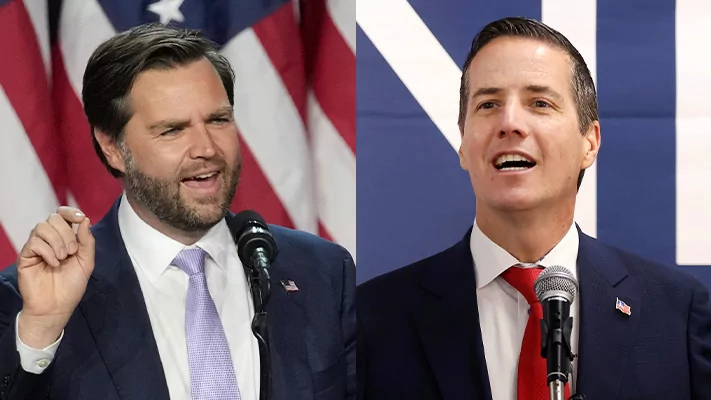
On the campaign trail, President-elect Donald Trump promised wholesale change for the nation. It will begin even before his Jan. 20 inauguration with complete turnover in Ohio’s Senate delegation.
Republican Sen.-elect Bernie Moreno on Nov. 5 beat Sen. Sherrod Brown (D-OH), a populist liberal icon. Brown was first elected to the Senate in 2006 after 14 years in the House, and he’d been in elected office most of his adult life. Moreno’s win helped Republicans capture the Senate majority for the first time since a pair of January 2021 special elections for Georgia Senate seats gave Democrats control of the chamber for what turned out to be four years.
Ohio’s other Senate seat, held by Sen. J.D. Vance (R-OH) for just under two years, also will soon have a new occupant. Vance is now the vice president-elect, tapped by Trump, the 45th and soon-to-be 47th president, as his running mate over the summer. Gov. Mike DeWine (R-OH) will appoint a replacement once Vance, 40, resigns from the Senate, at some point before Inauguration Day.

Vance on the national campaign trail faced torrents of Democratic and journalist criticism. But his populist-nationalist message, and willingness to confront challenging questions from all media quarters, impressed many voters and contributed to what may end up as the first Republican popular vote triumph since President George W. Bush’s reelection in 2004.
Whether Republicans hold full control of the federal government remains to be seen, with many House races uncalled. But should Republicans hold their current House majority, a distinct possibility considering the broad sweep of GOP wins nationwide, the incoming Trump-Vance administration would have wide latitude to enact its policy agenda.
A different kind of Bernie in the Senate
Moreno couldn’t be further ideologically than his longtime Senate namesake, Sen. Bernie Sanders (I-VT). The self-declared socialist on Election Day won a fresh, six-year term in the Senate, where he was first elected in 2006 after 16 years in the House and eight years prior as mayor of Burlington, Vermont.
The dichotomy between the two Bernies will soon be clear on any number of public policy issues. Moreno, who immigrated from Colombia to the United States as a child, railed against Brown and President Joe Biden’s administration on border security. Moreno also frequently criticized Vice President Kamala Harris, Trump’s vanquished 2024 Democratic opponent. Moreno argued for more domestic energy production. Moreno further called for fewer business regulations and tax cuts for companies that keep jobs in the United States.
As for Brown, a populist-left favorite and frequent MSNBC guest, he could no longer outrun the political gravity of his state. Trump has won Ohio three times, with 2024 his highest margin yet at about 11 points. Moreno hugged Trump tightly politically, earning his endorsement as a reddening electorate overcame Brown’s incumbency advantage and longtime populist image. Moreno also benefited from a wave of cryptocurrency money seeking to oust Brown, the Senate Banking Committee chairman.
The other Senate seat from Ohio will go to a replacement of DeWine’s choice. The person will hold the seat until a special election is held in November 2026. DeWine’s appointee must run in that election if he or she wants to keep the seat for the final two years of the term Vance won in 2022, in his rookie bid for public office.
Senate Republican agenda
Once Moreno and Vance’s Senate replacement are in office, the new Senate Republican majority will have a wide berth to set the national legislative agenda. The majority may reach into the mid-50s when all outstanding races are counted. One wild card is whether centrist Sens. Susan Collins (R-ME) and Lisa Murkowski (R-AL) will assume their familiar roles as political dams for more conservative pieces of legislation. Yet if the Senate Republican majority is big enough, Trump’s GOP allies in the chamber may be able to maneuver around the pair.
One area in which Trump is likely to get most of what he wants is administration personnel. There’s little reason to think Republicans would block many, if any, of his Cabinet appointments or picks for other posts in his second administration. Some will likely be returning from his 2017-21 White House tenure, while a flock of newcomers could also emerge.
Conservatives are eager to see the second Trump administration work toward reducing federal spending, lowering taxes, and otherwise shrinking the federal government. Billionaire Elon Musk has been frequently mentioned for a position overseeing such efforts.
“Hot take: With Elon Musk & other business leaders in his Administration, President Donald Trump will cut the size and scope of government (especially the regulatory state) more than Ronald Reagan ever did. Bookmark this,” wrote Cesar Conda, a veteran Republican Capitol Hill and White House aide, on X as news of GOP victories nationwide rolled in the morning after Election Day.
If Republicans end up holding their House majority, GOP senators could also consider eliminating their chamber’s filibuster rule. That would mean 60 votes in the 100-member chamber no longer would be needed to consider legislation and then pass it — only a bare majority of 51.
Republican senators have long resisted changing the filibuster rule, taunting Democrats for suggesting they would do so if in a position to. Sen. Mitch McConnell (R-KY), who is about to step down from his role as Republican leader after nearly 18 years, successfully pushed back on Trump’s efforts to end the filibuster during his first White House term.
However, McConnell’s replacement as Senate majority leader may not feel the same compunction to keep the filibuster in place. With it gone, Republicans in a unified GOP government could enact virtually any agenda item they wanted — including, among other things, making permanent the 2017 Tax Cuts and Jobs Act, Trump’s signature domestic achievement during his first four years as president.
KEY DATES FOR THE 2024 PRESIDENTIAL TRANSITION
Senate Democrats, meanwhile, would find themselves arguing against changing the very rule many argued on the campaign trail should be abolished. The prospect of a full Republican government will likely bring about some changes of heart among Democrats, to put it mildly, since the Senate filibuster would be Democrats’ last line of defense against the Trump agenda.
“So how are people feeling about the filibuster now?” Washington Post columnist Karen Tumulty asked, archly, on X the morning of Nov. 6.





